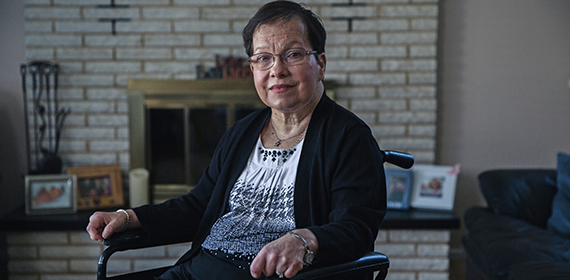Together - Reeve Foundation
In acknowledging Spinal Cord Injury Awareness Month, I think it is more than appropriate to acknowledge it together with those heroes who provide day-to-day care to those of us who have a spinal cord injury because it affects not only the person with paralysis, but family and friends, as well. So, it not only "happens" to the person it directly affects, but it also “happens” to everyone in their world.
Caregiving for someone who has a spinal cord injury is a daunting task. It is something that no one signed up to do and for which very few are prepared. It is an arduous task, even when prepared and given with love.
The following is what happened to my family and me, but it is significant because it represents what happens in homes all over the country and worldwide.
 After my spinal surgeries and paralysis in December 1985 and after seven months of hospitalization, including an extended stay in a rehab facility, I was able to begin to move my arms and started to stand up and take some steps. But my husband, Walter, and I both knew it was going to be a long road back.
After my spinal surgeries and paralysis in December 1985 and after seven months of hospitalization, including an extended stay in a rehab facility, I was able to begin to move my arms and started to stand up and take some steps. But my husband, Walter, and I both knew it was going to be a long road back.
After my stint at the rehab center, I arrived home to a more comforting and familiar setting. But it wasn’t any easier dealing with my difficulties in my home than it had been at the hospitals. In fact, in many ways, it was far more difficult than I had ever imagined. Things that didn’t pose problems in the hospital now became major obstacles to getting through each day. How was I going to dress myself? Cook? Go back to work? I had a myriad of questions. Unfortunately, the answers were in short supply.
Once I got home from the rehab center, when the nurse wasn’t there, Walter was. He helped me with dressing and became my chauffeur to work and doctor appointments. Sometimes, he and our then four-year-old son, Jeffrey, also filled in as my cheerleaders!
Needless to say, it was a very difficult time in many, many ways and for many, many reasons. But I do believe that good things can come from bad situations – a variation on the "that which does not kill you makes you stronger" philosophy.
In response to the depths and broad range of my needs, when I returned home came all the help I could use. It was freely given, which made it at least a bit easier for me to accept. With Walter’s help, I returned to work. He helped me to dress in the morning, got breakfast for Jeffrey, and then drove me to work before ever getting to his office. He reversed the order at the end of each day. Such was his schedule day after day, five days a week from November 2, 1986, until September 23, 1989, when I finally was able to drive myself to work.
Driving again helped, but the rest of Walter’s schedule remained intact. Despite my best efforts to remain positive, every once in a while, I couldn’t help but verbalize what I was feeling. “How are we going to do this?” I would ask.
In May 2011, I asked the question yet again after I fell and broke my shoulder, bringing on a whole new round of caregiving. Walter replied now, as he did all those years ago. “We’ll get through this just like we get through everything else, just as we’ve always done.” We’ve been married for so long that I can finish the thought for him. “Together.”
Even in our toughest times, we can still manage to find humor in a situation. With my arm in a sling, it was difficult for me to wash my face. Walter thought he would help the process along. He got a washcloth and began to scrub my face. I yelled out, “Wait! You don’t have to rub that hard! I’m not that dirty!”
Walter has been my hands and legs for the nearly thirty-seven years since I became paralyzed. But he’s been my heart for many years before that.
Written by Donna Lowich, Senior Information Specialist, National Paralysis Resource Center. You may reach an Information Specialist at 800-539-7309 or online at www.ChristopherReeve.org/Ask.
Join Our Movement
What started as an idea has become a national movement. With your support, we can influence policy and inspire lasting change.
Become an Advocate